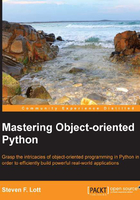
The base class object __init__() method
Fundamental to the life cycle of an object are its creation, initialization, and destruction. We'll defer creation and destruction to a later chapter on more advanced special methods and only focus on initialization for now.
The superclass of all classes, object, has a default implementation of __init__() that amounts to pass. We aren't required to implement __init__(). If we don't implement it, then no instance variables will be created when the object is created. In some cases, this default behavior is acceptable.
We can always add attributes to an object that's a subclass of the foundational base class, object. Consider the following class that requires two instance variables but doesn't initialize them:
class Rectangle:
def area( self ):
return self.length * self.width
The Rectangle class has a method that uses two attributes to return a value. The attributes have not been initialized anywhere. This is legal Python. It's a little strange to avoid specifically setting attributes, but it's valid.
The following is an interaction with the Rectangle class:
>>> r= Rectangle() >>> r.length, r.width = 13, 8 >>> r.area() 104
While this is legal, it's a potential source of deep confusion, which is a good reason to avoid it.
However, this kind of design grants flexibility, so there could be times when we needn't set all of the attributes in the __init__() method. We walk a fine line here. An optional attribute is a kind of subclass that's not formally declared as a proper subclass. We're creating polymorphism in a way that could lead to confusing and inappropriate use of convoluted if statements. While uninitialized attributes may be useful, they could be the symptom of a bad design.
The Zen of Python poem (import this) offers the following advice:
"Explicit is better than implicit."
An __init__() method should make the instance variables explicit.